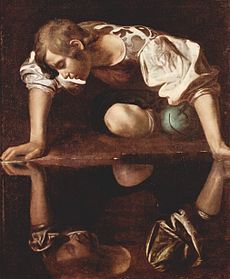Number
Monday, 2 May 2011
Wednesday, 30 March 2011
The two questions Freud proposes are:
- How does narcissism relate to auto-eroticism, that is, obtaining sexual gratification from one's own body?
- Is it important to distinguish libido which takes the form of sexually charged desire from the basic impulses of the ego such as self-preservation?
In responding to the first question, Freud makes a crucial statement: "I may point out that we are bound to supposed that a unity comparable to the ego cannot exist in the individual from the start; the ego has to be developed" (76-77). This is a fundamental theoretical argument, the one on which Jacques Lacan bases his arguments in "The Mirror Stage."
Auto-eroticism is a condition that pre-exists the formation of the ego; elsewhere Freud refers to the "polymorphous perversity" of the infant. Since narcissism is defined as an investment of libido in the ego, the ego and narcissism must come into being concurrently. Freud seems to suggest here that narcissism is a later stage in human development than auto-eroticism, but it is important to remember that narcissism does not replaceauto-eroticism; as with most features of psychic life in the Freudian model, earlier stages continue to persist alongside later developments.
In responding to the second question, Freud digresses for a moment to reflect on the relationship between speculative theory and empirical observation. Freud seeks to reinforce the status of psychoanalysis as a science; he insists that rather than proceeding from clearly defined concepts--which allow for neat, logical argumentation--the scientist must "face the facts," taking into careful account the actual nature of phenomena that do not always correspond to the concepts and assumptions of the theories that claim to explain them.
'Even as I begin reimagining narcissus, I am caught in at echo chamber wherer disputatious discourses resonate off one another, creating polyphonic moments of harmony followed by the harshest of atonal dicords.' - Narcissuss Transformed Gray Kochhor - Lindgren (3)
'Trapped in an infinitley reflecting hall of mirrors... Perhaps there is a way out, a way beyond the reflective mirrorings, perhaps not.' Narcissuss Transformed Gray Kochhor - Lindgren (3)
Exploring the idea that narcissistic behaviour encloses its host, both erratic and calm characteristics resonate off echother, creating a back and forth effect, stuck in this 'hall of mirrors'. This reflection is the subject of the object and Lawrence C'ohoone explains that these two states may merge, the person may only become the appearance of an appearance.
'Trapped in an infinitley reflecting hall of mirrors... Perhaps there is a way out, a way beyond the reflective mirrorings, perhaps not.' Narcissuss Transformed Gray Kochhor - Lindgren (3)
Exploring the idea that narcissistic behaviour encloses its host, both erratic and calm characteristics resonate off echother, creating a back and forth effect, stuck in this 'hall of mirrors'. This reflection is the subject of the object and Lawrence C'ohoone explains that these two states may merge, the person may only become the appearance of an appearance.
Monday, 28 March 2011
The Story of Narcissus
The Story of Narcissus reflects how important it is not to get lost in ones reflection as, Orlan suggests. The story is a tale of unrequited love, firstly of Narcissus to Echo and secondly of Narcissus' reflection to Narcissus. The link of this story with mental health is apparent and links closely with Freud's psycho-sexual stages of adolescence.
Full story found through this link http://narcissus.info/the-story-of-narcissus.html
Full story found through this link http://narcissus.info/the-story-of-narcissus.html
Tuesday, 15 March 2011
Monday, 14 March 2011
Friday, 11 March 2011
Subscribe to:
Comments (Atom)



